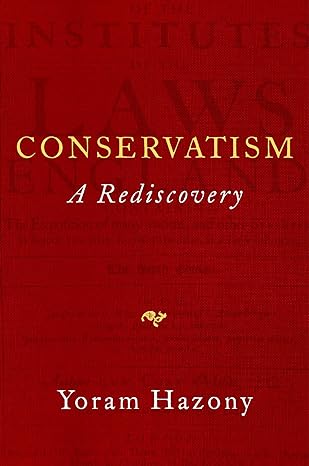[ad_1]
It might be tough for the standard observer of American politics to doubt that conservatism is in disaster. At current, Joe Biden’s approval rankings are fairly low, regardless of usually favorable financial situations. Majorities of the American public disagree with the Democratic social gathering on vital points associated to race and gender ideology. In regular circumstances, one would count on this to be a time when the Republican social gathering to be ascendant in a significant means. As an alternative, what we see is a Republican social gathering that appears decided to self-immolate and snatch a devastating defeat from the jaws of what needs to be a simple victory.
What explains this disfunction amongst American conservatives? Maybe conservatism, as an concept, is doomed to finish in failure. Or, maybe, true conservatism has been misplaced, and must be recovered. It’s this concept that animates Yoram Hazony in his ebook Conservatism: A Rediscovery. Hazony believes {that a} “outstanding reality about modern conservatism” might be present in “the extraordinary confusion over what distinguishes Anglo-American conservatism from Enlightenment liberalism (or ‘classical liberalism’ or ‘libertarianism’ or, for that matter, from the philosophy of Ayn Rand).” George Will, in his ebook The Conservative Sensibility, considers American conservatism primarily based on the concept of conserving the values of the Founders, which have been in flip derived from the classical liberal values of the Enlightenment. So, to George Will, American conservatism is about conserving the classical liberal custom. Not so for Hazony. He believes the broader custom of Anglo-American conservatism stands in distinction from, and is in some ways against, classical liberalism and Enlightenment values.

Hazony believes that true conservatism must be rediscovered, and its restoration is critical to enhance the state of the nation. That is made all of the extra obligatory as a result of Enlightenment liberalism has failed: “The hegemony of liberal concepts, which was presupposed to final eternally and to be embraced by all nations, has come to an finish after solely sixty years.” Liberalism has been unable to resist the challenges of radical Progressivism or Marxism. As a result of liberalism is essentially completely different from conservatism, liberalism lacks the instruments essential to preserve itself: “For the reality—which at this level can’t be repeated steadily sufficient—is that Enlightenment liberalism, as a political ideology, is bereft of any curiosity in conserving something. It’s devoted totally to freedom, and particularly to freedom from the previous. In different phrases, liberalism is an ideology that guarantees to liberate us from exactly one factor, and that factor is conservatism. That’s, it seeks to liberate us from the type of private and non-private life by which women and men know what have to be completed to propagate helpful concepts, behaviors, and establishments throughout generations and see to it that these items actually are completed.”
Regardless of this grim evaluation, Hazony is hopeful that true conservatism might be rediscovered: “Is it doable for a society whose traditions have grown so faint to revive them? Is it doable for people who’ve grown up in a liberal society obsessive about private freedoms to grow to be robust conservative women and men and to do what a conservative calling calls for of them? I imagine it’s doable as a result of I’ve seen it occur many instances over the course of my life. It’s doable for people to find that they’ve been on the improper course, repent, and set out on a brand new and higher course. And that is doable, too, for households and congregations, tribes and nations.”
That is bold, to make certain. And as a result of this ambition, Hazony’s imaginative and prescient of conservatism deserves cautious consideration and scrutiny. Over the subsequent a number of posts, I’ll go over the main concepts in Hazony’s ebook. As all the time after I do these ebook critiques, I’ll be presenting, fairly than evaluating, Hazony’s argument, and if anybody has questions within the feedback, my responses might be tailor-made to characterize Hazony’s view as I perceive it, fairly than presenting my very own views. My analysis and critique of the ebook might be saved for the ultimate posts.
[ad_2]
Source link

